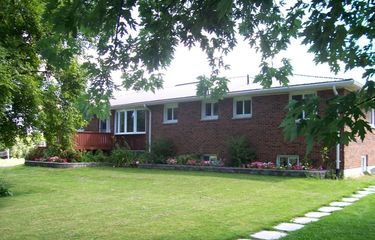"The Three Interdependent Components Of Helping At Risk Youth To Attach Include Care, Treatment And Educational Elements."
Family Based Care
Bayfield’s Family Based Care (FBC) program is designed to meet the individual needs of children and youth who are ready and able to live in a family setting. Our core outcome objective is for children to form healthy attachments. In this highly supportive environment, the child with a history of adversity is helped to: develop supportive relationships with adults; form peer relationships; develop socialization skills; focus on self-worth; engage in appropriate behaviour; practice life skills, and; manage stressful situations.
Bayfield places a high importance on the support offered in the Family Based Care program. FBC providers are selected and vetted through the SAFE Homestudy program. They meet with the FBC Program Supervisor for support, to ask questions and plan for treatment and care on a regular basis. In addition to regular site visits, the FBC Program Supervisor conducts annual reviews of the homes, offering the FBC providers recommendations for improving the services offered to our youth. The continued support of Bayfield’s clinical services, psychiatric monitoring, private school and crisis response personnel are available as required for homes located in Hastings and Prince Edward Counties. As well, access to a Clinical Therapist, Program Supervisor and Director for crisis support is available to our FBC providers 24 hours a day, 7 days a week. Care providers within the FBC program form a community; they are encouraged to develop an informal support system with one another.
We also have several homes in the Greater Toronto Area (GTA), including the central city of Toronto and the four regional municipalities of Durham, Halton, Peel and York. Our FBC providers in the GTA represent the culturally and ethnically diverse population of this region. These families are also selected and vetted through the SAFE Homestudy program; are visited by the FBC Program Supervisors on a regular basis and; in addition to regular site visits, the FBC Program Supervisor conducts annual reviews of these homes as well. Educational and health services are provided within the communities that the homes are located in and we have an extensive list of Child and Youth Care workers that are available to provide additional support to the families if required.
Bayfield places a high importance on the support offered in the Family Based Care program. FBC providers are selected and vetted through the SAFE Homestudy program. They meet with the FBC Program Supervisor for support, to ask questions and plan for treatment and care on a regular basis. In addition to regular site visits, the FBC Program Supervisor conducts annual reviews of the homes, offering the FBC providers recommendations for improving the services offered to our youth. The continued support of Bayfield’s clinical services, psychiatric monitoring, private school and crisis response personnel are available as required for homes located in Hastings and Prince Edward Counties. As well, access to a Clinical Therapist, Program Supervisor and Director for crisis support is available to our FBC providers 24 hours a day, 7 days a week. Care providers within the FBC program form a community; they are encouraged to develop an informal support system with one another.
We also have several homes in the Greater Toronto Area (GTA), including the central city of Toronto and the four regional municipalities of Durham, Halton, Peel and York. Our FBC providers in the GTA represent the culturally and ethnically diverse population of this region. These families are also selected and vetted through the SAFE Homestudy program; are visited by the FBC Program Supervisors on a regular basis and; in addition to regular site visits, the FBC Program Supervisor conducts annual reviews of these homes as well. Educational and health services are provided within the communities that the homes are located in and we have an extensive list of Child and Youth Care workers that are available to provide additional support to the families if required.
Staff Supported Milieu
Our staff supported homes serve the needs of youth who require a highly structured living environment and intensive therapeutic intervention. By increasing youth’s self esteem and creating a safe and structured environment where youth can learn by their experiences and choices, we enable youth to make the transition to less structured living environments through the continuum of care with an eventual repatriation to their own home communities, i.e., kinship care. Youth are placed in homes based on gender, age and their presenting issues and are assessed individually, through the Plan of Care process, to determine their ability to move to a less structured environment on an on-going basis.
At Bayfield, we believe that all staff play a significant role in the youth’s treatment and we strive to promote positive relationships between youth and adults at all levels of the organization. There is a Client Services Coordinator assigned to each home who fulfills the case management responsibilities for the youth living in there, coordinating planning meetings (Plans of Care) to develop the differentiated service plans for Bayfield youth and ensuring that they are carried out within the treatment homes. Our treatment homes are staffed with Child Care Therapists who have a range of education and experience. Child Care Therapists and Team Leaders working in the treatment homes are required to have a postsecondary diploma or degree related to the social service field, such as Child and Youth Care Worker, Social Services Worker, Developmental Services Worker, etc. All program personnel receive regular clinical training in terms of how to work with youth and, at the same time, work closely with the clinical and educational departments within Bayfield, to assist the youth in overcoming difficulties of an emotional, social, behavioural and/or intellectual nature.
Life space work performed daily in the staff supported milieus is a clinical intervention where the direct care staff engage young people on their journey of self-discovery and experimentation and provide opportunities for nurture and caring. The staff supported milieus are structured in such a manner that brings staff and young people together in common activities and joint problem-solving contexts. Bayfield staff employ a work-with and play-with approach to engaging, mentoring and teaching our youth in the areas of life skills and recreational activities. Chores, sports, games and crafts offer an informal but highly effective method of fostering relationships, as well as developing interpersonal and life skills with our youth. More formal training occurs in skill-based groups that are co-facilitated by Clinical Therapists and Child Care Therapists. Recreational activities at Bayfield occur during the day, in the evenings and on weekends to provide an enjoyable and constructive leisure experience. As youth progress in their treatment, autonomy is increased and they are encouraged to become involved in structured community activities, based on the youth's interest, ability and risk level.
At Bayfield, we believe that all staff play a significant role in the youth’s treatment and we strive to promote positive relationships between youth and adults at all levels of the organization. There is a Client Services Coordinator assigned to each home who fulfills the case management responsibilities for the youth living in there, coordinating planning meetings (Plans of Care) to develop the differentiated service plans for Bayfield youth and ensuring that they are carried out within the treatment homes. Our treatment homes are staffed with Child Care Therapists who have a range of education and experience. Child Care Therapists and Team Leaders working in the treatment homes are required to have a postsecondary diploma or degree related to the social service field, such as Child and Youth Care Worker, Social Services Worker, Developmental Services Worker, etc. All program personnel receive regular clinical training in terms of how to work with youth and, at the same time, work closely with the clinical and educational departments within Bayfield, to assist the youth in overcoming difficulties of an emotional, social, behavioural and/or intellectual nature.
Life space work performed daily in the staff supported milieus is a clinical intervention where the direct care staff engage young people on their journey of self-discovery and experimentation and provide opportunities for nurture and caring. The staff supported milieus are structured in such a manner that brings staff and young people together in common activities and joint problem-solving contexts. Bayfield staff employ a work-with and play-with approach to engaging, mentoring and teaching our youth in the areas of life skills and recreational activities. Chores, sports, games and crafts offer an informal but highly effective method of fostering relationships, as well as developing interpersonal and life skills with our youth. More formal training occurs in skill-based groups that are co-facilitated by Clinical Therapists and Child Care Therapists. Recreational activities at Bayfield occur during the day, in the evenings and on weekends to provide an enjoyable and constructive leisure experience. As youth progress in their treatment, autonomy is increased and they are encouraged to become involved in structured community activities, based on the youth's interest, ability and risk level.
Psychology and Psychiatry
At Bayfield, there is clinical integration into everyday practices, providing an organizational understanding of the connections between clinical thinking and the everyday operation of our staff supported milieus. In doing so, we create opportunities to develop differentiated service plans and treatment interventions for young people with very different needs. Bayfield’s clinical programming provides a comprehensive approach to treatment planning including the youth’s experiences of victimization, sexual abuse, physical abuse, neglect, family violence, exposure to substance abuse, deficits in social skills, emotional coping strategies and self-esteem.
Individual and group therapy are provided by Clinical Therapists, with education and significant experience in Psychology, Social Work, Counseling, Applied Behavioual Analysis, etc. They are registered practitioners and maintain their certifications with their provincial regulatory bodies. Their primary objective is to assist the youth on their caseload in becoming more psychologically flexible, expediting behavioural stabilization through skill development related to emotional regulation and in developing alternative coping strategies, so that youth can adapt and successfully integrate into their environment, in order to facilitate their progression through Bayfield's continuum of care.
Bayfield contracts with licensed Psychiatrists, that are members in good standing with the College of Physicians and Surgeons of Ontario, to provide psychiatric consultation, assessment, diagnostic and treatment services to the youth within the Bayfield programs. They also provide education to the youth, their families, placing agency workers and treatment teams with regard to any medications prescribed for the purpose of alleviating identified symptoms. Psychiatric services are provided in strict compliance with current federal and provincial legislation, the College of Physicians and Surgeons Practice Guide, Bayfield policies and procedures and according to CARF (Commission on Accreditation of Rehabilitation Facilities) international standards.
Individual and group therapy are provided by Clinical Therapists, with education and significant experience in Psychology, Social Work, Counseling, Applied Behavioual Analysis, etc. They are registered practitioners and maintain their certifications with their provincial regulatory bodies. Their primary objective is to assist the youth on their caseload in becoming more psychologically flexible, expediting behavioural stabilization through skill development related to emotional regulation and in developing alternative coping strategies, so that youth can adapt and successfully integrate into their environment, in order to facilitate their progression through Bayfield's continuum of care.
Bayfield contracts with licensed Psychiatrists, that are members in good standing with the College of Physicians and Surgeons of Ontario, to provide psychiatric consultation, assessment, diagnostic and treatment services to the youth within the Bayfield programs. They also provide education to the youth, their families, placing agency workers and treatment teams with regard to any medications prescribed for the purpose of alleviating identified symptoms. Psychiatric services are provided in strict compliance with current federal and provincial legislation, the College of Physicians and Surgeons Practice Guide, Bayfield policies and procedures and according to CARF (Commission on Accreditation of Rehabilitation Facilities) international standards.
Private School Education
Established in 1976, the Bayfield School has grown and evolved from a single teacher, one-room schoolhouse to a multi-dimensional special education program with a capacity for 90 students and a diverse staffing complement of teachers and Educational Support Staff. The physical structure of the Bayfield School comprises over 13,000 square feet including 13 classrooms, a library, wood shop and a 3,000 square foot gymnasium on an 11-acre campus.
The Bayfield School is a private school for students in kindergarten to grade 12. Our school is inspected bi-annually by the Ontario Ministry of Education and is authorized to grant credits towards an OSSD. Teachers certified with the Ontario College of Teachers deliver academic programming across all standard subject areas. Non-academic programming is also available, including art, outdoor education, wood shop, and other vocational and life skills programming. Student timetables are built around individual strengths, needs and goals. Child and Youth Workers, from the staff supported milieu homes, attend school with their youth, fostering a community of support for students in the school.
The program is designed to meet the needs of students with psychiatric and/or behavior problems who range in age and ability, and who have historically struggled in school. Embedded within daily learning activities is the prioritization of the development of learning skills in self-regulation, responsibility, initiative, organization, collaboration, and independent work. With a focus on these skills, we plan for students to advance their socialization and overall engagement in school to help prepare them for a return to the public school system.
The Bayfield School is a private school for students in kindergarten to grade 12. Our school is inspected bi-annually by the Ontario Ministry of Education and is authorized to grant credits towards an OSSD. Teachers certified with the Ontario College of Teachers deliver academic programming across all standard subject areas. Non-academic programming is also available, including art, outdoor education, wood shop, and other vocational and life skills programming. Student timetables are built around individual strengths, needs and goals. Child and Youth Workers, from the staff supported milieu homes, attend school with their youth, fostering a community of support for students in the school.
The program is designed to meet the needs of students with psychiatric and/or behavior problems who range in age and ability, and who have historically struggled in school. Embedded within daily learning activities is the prioritization of the development of learning skills in self-regulation, responsibility, initiative, organization, collaboration, and independent work. With a focus on these skills, we plan for students to advance their socialization and overall engagement in school to help prepare them for a return to the public school system.
Service Coordination
At Bayfield, a Client Services Coordinator is responsible for the development of the Plan of Care and the coordination of services for each youth. Treatment at Bayfield is a targeted, short-term and intensive support program that will diagnose, stabilize and triage youth to a less restrictive community placement. Transition planning for youth begins at admission.






